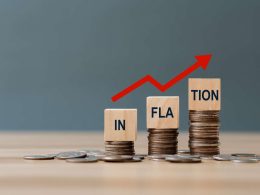Are you feeling the pinch of rising prices when you go to the grocery store or fill up your gas tank? You’re not alone. Inflation in the United States is on the rise, hitting consumers hard and causing concern for the future. But what exactly is inflation, and how does it affect our daily lives? In this blog post, we’ll take a closer look at the numbers behind rising inflation and discuss some strategies for fighting back against its impact on our wallets. So buckle up, grab a cup of coffee, and let’s dive into this important topic together!
What is inflation?
Inflation is a term used to describe the increase in prices of goods and services over time. It means that you need more money today than you did yesterday to buy the same thing. Inflation happens when there is too much money chasing too few goods or when production costs increase, leading businesses to raise their prices.
The Consumer Price Index (CPI) is a common measure of inflation in the US, tracking changes in prices for a basket of goods and services including food, housing, transportation, healthcare, and more. When CPI goes up so do prices.
It’s important to note that some level of inflation is considered healthy for an economy because it encourages spending and investment. However, high levels of inflation can be harmful as it erodes purchasing power.
Inflation affects everyone differently depending on their income level and spending habits. Those with fixed incomes like retirees or people living off savings are particularly vulnerable since they have limited options for increasing their income during times of rising prices.
Understanding what inflation is and how it works can help individuals make informed decisions about their finances amidst changing economic conditions.
What are the causes of inflation?
Inflation, simply put, is the rise in prices of goods and services over time. But what causes inflation? There are various factors that contribute to it. One major cause is an increase in demand for products or services without enough supply to match it. This leads to a shortage, which results in a price hike.
Another contributing factor is the cost-push effect where an increase in production costs such as labor wages and raw material costs lead manufacturers to pass on these expenses to consumers by raising their prices. In addition, increased government spending can also cause inflation if there’s not enough revenue generated through taxes.
The global economy can also influence inflation rates due to fluctuations in currency exchange rates. When the value of the dollar drops against other currencies, imports become more expensive for American companies leading them to raise their prices too.
Natural disasters or political instability can disrupt supply chains and lead to shortages causing prices of essential goods like food and fuel skyrocketing.
All these factors ultimately result in higher consumer prices leading people’s purchasing power reduced making them struggle economically while maintaining daily needs like food and shelter.
How does inflation affect people’s lives?
Inflation is the gradual increase in prices of goods and services over time, leading to a decrease in purchasing power. The consequences of inflation can be felt by everyone, regardless of their social or economic status.
For starters, inflation affects the cost of living for ordinary citizens. When prices rise, people have to pay more for basic necessities like food, fuel and housing. This means that families may struggle to afford everyday essentials which can lead them into debt.
In addition, inflation erodes savings as it reduces the value of money over time. For instance, if you had saved $1000 a year ago and today’s rate is 5%, then your money would only buy you what $950 would have bought one year ago.
Moreover, inflation influences business decisions such as investments and hiring practices because companies must adjust to changes in consumer demand influenced by purchasing power fluctuations.
Finally yet importantly; Inflation has an impact on government policies regarding interest rates which determine borrowing costs for individuals who may find themselves paying higher interests due to these policies.
While some groups are affected more than others by rising prices caused by inflation; anyone who spends money should understand how this phenomenon could affect them personally – whether directly or indirectly!
How to fight against inflation?
Inflation can be a difficult problem to tackle, but there are ways that individuals and businesses can try to fight against it. Here are some strategies:
1. Invest in assets that appreciate over time: One way to counteract the effects of inflation is by investing in assets such as stocks or real estate that tend to increase in value over time.
2. Diversify your portfolio: Don’t put all your eggs in one basket when it comes to investments. Diversifying your portfolio with different types of assets can help protect against inflation.
3. Budget wisely: It’s important to create a budget and stick to it, especially during times of rising prices. This may mean cutting back on non-essential expenses or finding ways to save money on necessary purchases.
4. Consider alternative sources of income: If possible, consider taking on additional work or starting a side hustle to generate more income and offset the effects of inflation.
5. Stay informed: Keep up-to-date with economic news and trends so you can make informed decisions about your finances and investments.
By implementing these strategies, individuals and businesses may be better equipped to weather the impact of rising inflation rates in today’s economy.
What can consumers do to prepare for rising prices?
As the prices of goods and services continue to rise due to inflation, it’s important for consumers to take proactive measures in order to prepare themselves. Here are some tips on how you can do just that.
Firstly, try to save as much money as possible. One way of doing this is by cutting down on unnecessary expenses such as dining out or buying new clothes. Instead, focus on building an emergency fund that will come in handy during tough times.
Secondly, be mindful of your spending habits and make sure that you’re getting good value for your money. This means shopping around for the best deals and comparing prices before making a purchase.
Thirdly, consider investing in assets such as gold or real estate which tend to hold their value even during periods of rising inflation.
Stay informed about changes in the market and keep track of inflation rates so that you are aware of any potential price hikes or shifts in consumer behavior.
By following these steps, consumers can better prepare themselves for rising prices brought about by inflation.
Conclusion
Rising inflation is a major concern for US consumers. The increase in prices of goods and services affects everyone’s daily lives, especially those on fixed incomes or with limited financial resources. While there are several factors that contribute to inflation, the government has the tools to manage it effectively.
Consumers can take proactive steps to prepare themselves for rising prices by budgeting wisely and being mindful of their spending habits. It is also important to stay informed about economic trends and changes that could impact personal finances.
As we navigate through these challenging times, it’s important to remember that taking small steps can make a big difference in our financial well-being. By staying vigilant and making smart choices today, we can help safeguard our future against the effects of inflation.












